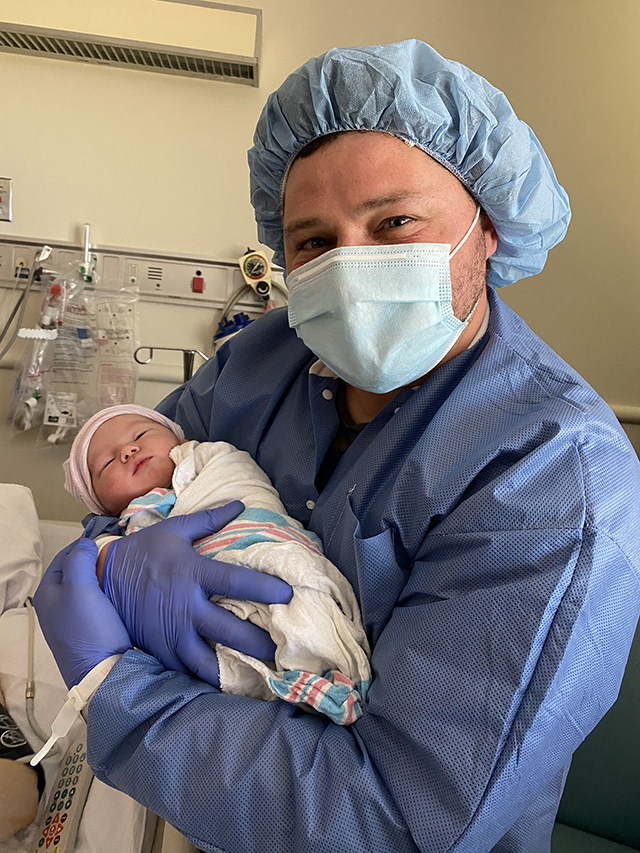Local nurse shares her story of giving birth during a pandemic

As the COVID-19 pandemic peaked in early April, Laura Kline began to hear from relatives wondering if she should consider contingency plans for the upcoming birth of her daughter. Her mother suggested they begin looking into a midwife for a home birth.
As hospitals expanded capacity to meet the influx of COVID-19 patients, expectant mothers faced uncertainty about what would await them there.
Would there be sufficient room? Would it be safe? Would their significant other be allowed in the delivery room?
While the early information on COVID-19 showed that pregnant women appeared to face the same risk as other adults, according to the Centers for Disease Control and Prevention, much remained unknown about a disease that hadn’t existed before late 2019.
For Ms. Kline, 33, who works as a home care nurse for Northwell Health, a hospital delivery remained her top priority. She had just started her position with Northwell in February and was changing doctors mid-pregnancy in April as her new insurance began. She told her mother, “I don’t care what’s going on, I’m definitely going to a hospital.”
As her due date neared, and the baby’s position made it clear Ms. Kline would need to deliver via cesarean section, a specific date for delivery at Peconic Bay Medical Center was set. On May 13, she and her husband, Judson, welcomed their daughter, Charlee.
“It’s been a better experience than I initially anticipated,” Ms. Kline said in a recent interview from her Westhampton home, where only some immediate relatives have been able to see her newborn as precautions against the virus continue.
During the three months beginning in March, 109 babies were born at PBMC, all sharing a unique place in history for being born into a pandemic.
For Ms. Kline, whose daughter was delivered by Dr. Tiffany Hunter, the experience was at times stressful, from the weeks leading up to the birth to avoid contracting COVID-19, to soon after the birth, when her husband had to leave the hospital. But overall, she said, the level of care she received from PBMC staff made it as smooth a process as could be expected.

Ms. Kline, who had a virtual baby shower via Zoom, said she was lucky to be given the chance to work from home during the last few weeks before the delivery. The human resources staff at Northwell Health provided a laptop and headset, which she used to make phone calls related to COVID-19 testing, she said. That allowed her to stay mostly quarantined during the final weeks. Her husband, a plumber, had also stopped working a few weeks before the due date. She knew how important staying quarantined would be. She saw firsthand people who would come in for a birth or surgery with no symptoms but would be positive for the virus or have a spouse or partner who tested positive.
In the weeks before the birth, Ms. Kline’s husband would wait in the car during her appointments.
“That was never easy for him,” she said. “I would tell him stuff and he’d say, ‘Well please ask about this.’ ”
As the delivery neared, they were hopeful he could stay by her side throughout the hospital stay. But on the evening prior to delivery, a shift in hospital policy meant Mr. Kline could be present only for the delivery — outfitted with a gown, gloves and mask — and stay for about two hours afterward. He could return in a few days, once she was discharged.
“That kind of threw a wrench into things,” she said, adding that they were disappointed with the circumstances but that hospital staff helped fill the void.
Ms. Kline said the week she delivered appeared to be particularly hectic at the hospital, with several C-sections scheduled.
“The staff was lovely, which I think helped,” she said. “I was in the room alone, so I felt like I had to rely on them more than I would if my husband was in the room.”
At night, the nurses would offer to feed Charlee formula, if Ms. Kline gave permission. She said that was helpful at 2:30 a.m., when the baby didn’t seem to want to stop nursing.
She had a private room for most of her stay and said she was lucky in that regard since most private rooms were being reserved for COVID-19 patients. With no visitors allowed, the floor was especially quiet most of the time — one of the few positives of the strict guidelines in place to limit any spread of the virus. At times, Ms. Kline said, it was almost nice to not have to worry about how she looked when people visited her room. On the morning of her discharge, she shared a room with a mother who had just given birth to her fourth child.
“She was really nice in giving me motherly advice,” she said.
Since the Kline family arrived home from the hospital, they’ve been adjusting to their new life with Charlee, who is doing well. She constantly eats and sleeps well during the day — but not so much at night just yet.
As Ms. Kline reflected on the experience and what she would one day tell her daughter about being born during a pandemic, she thought of some sound advice: “She should go into health care, because she will always have a job.”








